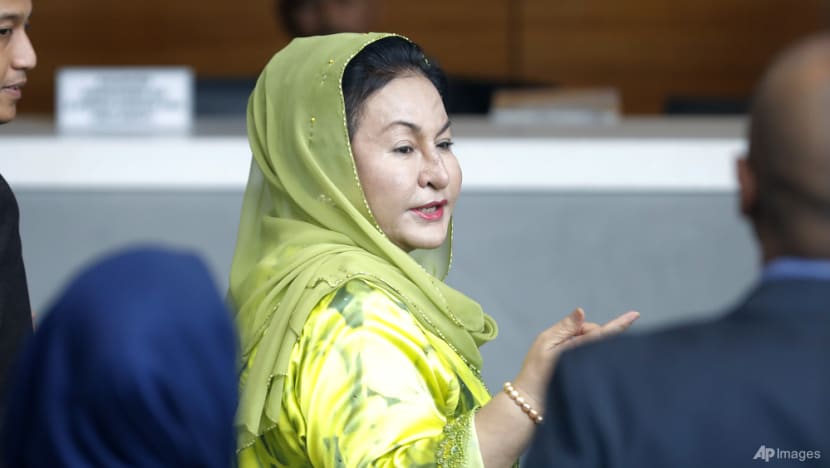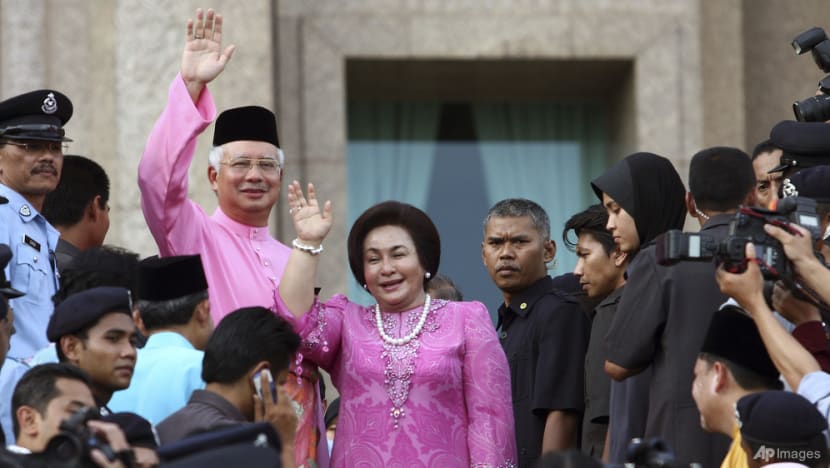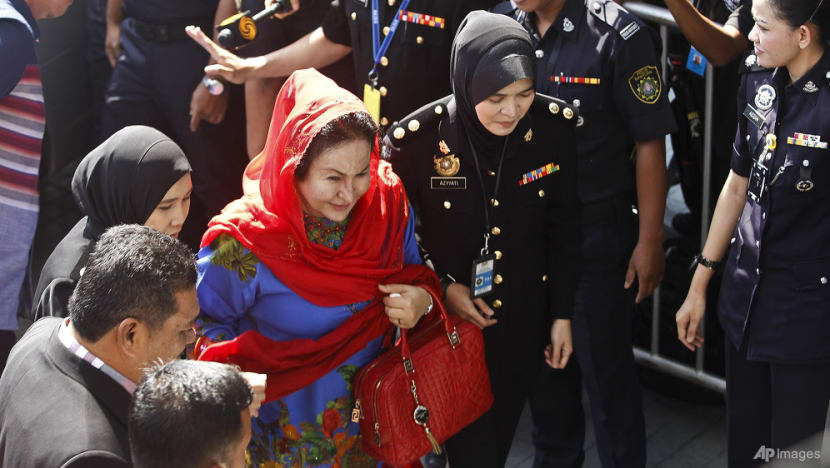Rosmah Mansor’s corruption conviction: 5 takeaways from the court judgment
The wife of former Malaysian prime minister Najib Razak was "far too clever" to demand for bribery herself, the court found.

Rosmah Mansor, wife of former Malaysia prime minister Najib Razak, arrives at the Anti-Corruption Agency for questioning in Putrajaya, on Oct 3, 2018. (Photo: AP/Vincent Thian)
Rosmah Mansor, the wife of former Malaysian prime minister Najib Razak, was sentenced to 10 years in jail and a fine of RM970 million (US$216 million) after she was found guilty of corruption on Thursday (Sep 1).
The 70-year-old was charged with soliciting RM187.5 million in bribes from contractor Saidi Abang Samsudin in 2016 and 2017 so that his company Jepak Holdings could secure a RM1.25 billion government project to supply solar energy to 369 rural schools in Sarawak state.
She was also accused of receiving a total of RM6.5 million in bribes from Saidi at the prime minister’s official residence in Putrajaya and then later at her private residence in Kuala Lumpur between December 2016 and September 2017.
Jepak Holdings had proposed to the Education Ministry sometime in 2015 to replace the existing Genset Diesel project, which was introduced in 2010 to provide electricity to the schools through diesel generator sets.
It proposed to take over the maintenance of the diesel generator sets and develop photovoltaic solar panels in a hybrid manner at a cost of RM1.25 billion for a five-year term.
In the full judgment issued on Thursday, High Court Judge Mohamed Zaini Mazlan said corruption has reached almost every level of society.
“It must be curtailed before it becomes pandemic. If corruption is left unbridled, our society will come to accept it as a way of life or business,” he wrote.
Here are five takeaways from the 116-page document:
ROSMAH “FAR TOO CLEVER” TO DEMAND FOR BRIBERY HERSELF
Rosmah was “no fool” and far too clever and wily to demand for the bribery herself, the court found.
She had used and instructed her aide at that time, Rizal Mansor, to make her bidding and solicit from Saidi for her benefit, the document added.
“The accused also claimed that she would have negotiated the deal herself with Saidi and Rayyan if it was for her benefit. It would have been undignified of her to do so.
“The accused appears to be dignified and thinks very highly of herself. This was evident from her demeanour on the witness stand and her standing in society as the prime minister’s wife then. Negotiating openly would have also exposed her misdeeds,” Judge Mohamed Zaini wrote.
According to the chronology of events in the full judgment, Rosmah made her demands through Rizal. It was also Rizal who arranged for the two handovers of cash from Saidi to Rosmah.

The first payment of RM5 million made on Dec 20, 2016 was delivered to Seri Perdana, the prime minister’s official residence in Putrajaya.
At Seri Perdana, Rizal instructed two of Rosmah’s butlers to carry the two bags of cash into the house. Saidi had earlier withdrawn the money from a Maybank branch in Medan Tuanku.
Upon seeing Rizal and the two bags, Rosmah asked him, “Berapa (How much)?” to which he responded, “Lima (five).” He came out empty-handed about 30 minutes later and returned to his car.
He told his acquaintance Ahmed Farrig Zainul Abidin, who was waiting in the car, that “it was settled” and they left Seri Perdana.
For the second payment of RM1.5 million, the judgment detailed that Saidi’s driver had placed two knapsacks of cash in the living room of Rosmah’s house in Kuala Lumpur on Sep 7, 2017.
Saidi told Rosmah he had brought the money as promised, and Rosmah nodded and said, “Hmmm.” Rizal saw Rosmah directing her butler to bring the two knapsacks upstairs to her room.
HER SPECIAL OFFICER ACTIVELY LOBBIED THOSE WHO WERE INVOLVED
Rizal was Rosmah’s special officer. He was employed by the Prime Minister’s Office under a two-year contract in 2009, which was then renewed until mid-2018.
He was initially charged under the Malaysian Anti-Corruption Commission Act with four charges that were closely related to the charges faced by Rosmah.
However, he was discharged and acquitted when the prosecution withdrew the charges against him in January 2020.
He became a key prosecution witness in Rosmah’s case. In March 2020, a deputy public prosecutor told the court that Rizal had been put under the witness protection programme.
The High Court found “what was most telling” in the case was Rizal’s active lobbying and constant harassment of those who had a part to play in the project, including former Education Minister Mahdzir Khalid and other officers at the Education Ministry.
Rizal had acted according to Rosmah’s instructions or for Rosmah's interest.
“| doubt that they would have carried out Rizal's instructions as he was not a high-ranking officer, if not for the fact that he was doing it on the accused’s behalf.
“He was, however, not just a special officer. He was the accused’s special officer or, at the very least, the accused’s trusted aide. Many of the prosecution’s witnesses have attested to this, which can only mean it is true,” Judge Mohamed Zaini wrote.

According to the judgment, Saidi and his business partner Rayyan Radzwill Abdullah had met up with Rizal In early 2016. The former asked Rizal to get Rosmah’s assistance so that the Education Ministry could issue the letter of award to Jepak soon.
After they told him that they were willing to make a donation amounting to 10 per cent of the project’s value to Najib to show their appreciation for his minutes and offering to pay him RM20 million, Rizal conveyed the request to Rosmah.
Rosmah agreed to meet them, which they did at her home in Jalan Langgak Duta. She was supportive of the project, and told them to discuss further with Rizal.
He would frequently update her on the progress – or lack of – encountered by Jepak, the court judgment showed.
“He had also conveyed Saidi and Rayyan’s frustrations with Mahdzir’s uncooperativeness. Rizal claimed that the accused was not pleased with Mahdzir,” the court document said.
In an example, Rizal helped Saidi and Rayyan when they wanted to amend a clause in the contract, telling Mahdzir that “Mem” was aware of the project and he was to comply with Jepak’s request. “Mem” was a reference to Rosmah.
According to Rizal, Rosmah also reminded him often to follow up on Saidi’s promised payments due to her. In addition, he instructed the new Education Ministry secretary-general, Alias Ahmed, to expedite payments to Jepak.
NAJIB WAS AWARE OF THE PROJECT
While Najib did not testify during the trial, he played a significant part in the case, according to the witnesses.
Saidi and his business partner Rayyan were said to have approached Rizal initially in October 2015 to ask if he could get Rosmah to obtain her husband’s approval for their project.
However, they were told that she “was not in the business of assisting contractors in getting Najib’s approval for projects”.
Following this, they sought the help of Aazmey Abu Talib, who was the secretary of United Malays National Organisation’s Pekan division in Pahang – a division headed by Najib.
Aazmey agreed to help and delivered a proposal letter from Saidi to Najib. The letter was returned with Najib’s minutes saying, “Agree to execute this new system and terminate the previous system,” as well as a letter from the Prime Minister’s Office.
Jepak sent another letter to Najib on Jun 2, 2016, in which they set out further details and proposals on the project.
This was forwarded to Mahdzir through a letter from the Prime Minister’s Office dated Jun 7. Saidi delivered the letters to Mahdzir personally the following day. Jepak’s letter also had Najib’s minutes saying, “Please execute according to my previous minutes.”
Saidi and Rayyan approached Aazmey again with Jepak’s letter to Najib, dated Nov 8, 2016. In that letter, Jepak requested Najib to direct Mahdzir to issue a letter of award to the company.
Following this, the Prime Minister’s Office issued a letter containing Jepak’s letter and a notation ordering the issuance of a letter of award.
LEAKED AUDIO RECORDINGS SHOWED ROSMAH GIVING INSTRUCTIONS TO NAJIB ON GOVERNMENT AFFAIRS
On Jan 8, 2020, the Malaysian Anti-Corruption Commission (MACC) had made nine audio recordings public, one of which was a conversation believed to be between Najib and Rosmah.
The clips, said to have been recorded between Jan 5, 2016 and Jul 29, 2016, were believed to be linked to the 1Malaysia Development Berhad (1MDB) scandal.
In one of the clips, a woman, believed to be Rosmah, could be heard berating Najib, offering him “advice” on how to manage the 1MDB scandal.
Frustrated that there were “goons” among Najib’s advisers, she said Najib should have taken charge and not anybody else.
“Can I advise you something?” she said, raising her voice.
“I don't like this. Darling, you are the prime minister, you should take charge and not anybody else okay? You got goons around you to advise you.”

Several prosecution witnesses, including Rizal and Mahdzir, listened to the audio recording in court and testified that the voice was that of Rosmah.
In his judgment, the judge noted that Rosmah attempted to downplay the conversation by relating it to a typical discussion between husband and wife.
“It, however, was no ordinary conversation between spouses, for it was about government affairs. It is clear from the audio recording that the accused gave instructions to Najib on government affairs.
“Her tone was commanding and contrary to her contention that she heeded Najib’s prohibition on not meddling in government affairs.”
The judge added: “I say this with the greatest of respect, but it is apparent that the accused dominates Najib. She has control over him.”
“She had no business interfering in Najib’s duties or the government’s affairs, but she did,” he wrote.
FORMER EDUCATION MINISTER MAHDZIR “ATTEMPTED TO DO THE RIGHT THING”
During the course of events, Mahdzir, the former Education Minister, “attempted to do the right thing”, the court found.
He was reluctant to circumvent the ministry's procedure.
“He had even gone to the extent of trying to persuade Najib on two occasions personally,” the judge wrote.
When presented with the letter of proposal from Jepak in the beginning, Mahdzir noted that the project would require specialised skills, which he doubted the company had.
Additionally, he had reservations about its capability to undertake such a massive commitment. Nonetheless, he instructed an officer in the Education Ministry to form a technical team and call upon Jepak to submit its proposal.
When pushed by Saidi and Rayyan to speed up the approval for the project, he told them they would need to go through the usual procedure and wait for the ministry’s official response.
They were not happy with this arrangement, and Najib later instructed Mahdzir to issue a letter of award “immediately”.
Despite pressure from Rizal, Saidi and Rayyan, Mahdzir refused to deviate from the course of action taken by his ministry. However, he received another set of instructions from Najib to proceed with his previous minutes, at which he “felt he had no choice but to approve the project”.
According to the judgment, Mahdzir spoke to Najib sometime in June 2016, during which he tried to convince him to use an open tender for the project and not through direct negotiations with Jepak. However, Najib was adamant and told him to carry out his instructions.

In November 2016, he met Najib again and advised him to defer the issuance of the letter of award to Jepak as there were few requirements that the company and the Education Ministry had to fulfil.
Mahdzir also complained of Saidi and Rayyan’s “constant harassment and disrespectful attitude toward him as a minister”.
However, Najib ignored his plea and instructed him to follow his instructions immediately, to which he felt “he had no choice but to adhere”.
















